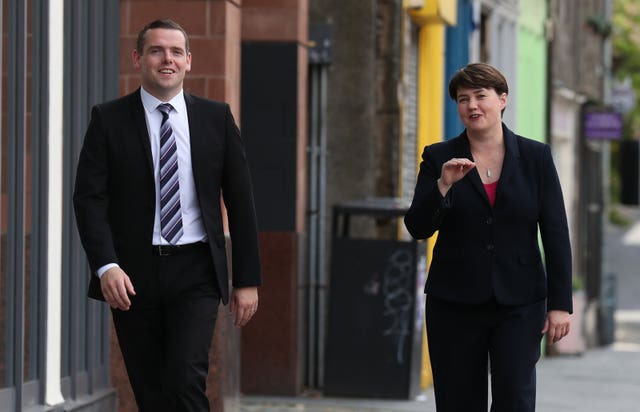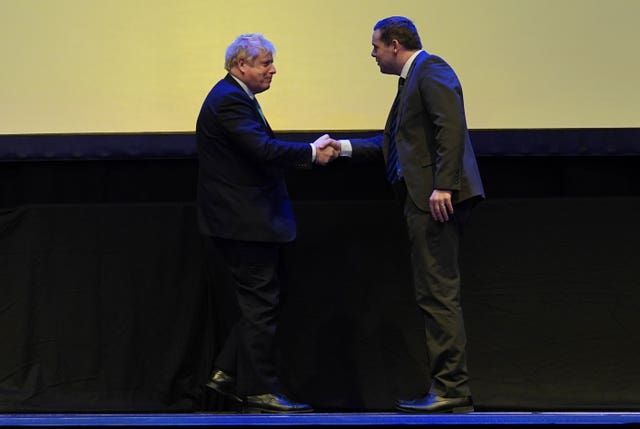World
Douglas Ross: The Scottish Tory leader brought down by his decision to stand

Douglas Ross was brought down by his own U-turn on standing for election.
The former Scottish Tory leader – who announced last month he would leave the post – was beaten in Aberdeenshire North and Moray East.
It was his treatment of former MP David Duguid that eventually led to his downfall, with some in the Tory ranks briefing against him in the press after he announced he would be the Conservative candidate in the seat instead of Mr Duguid who was barred by party chiefs due to ill health.
Thursday’s disappointment for Mr Ross is a far cry from his political beginnings, which saw him win a seat on Moray Council in 2007 aged 24.
Over the ensuing years, he battled for a seat at Westminster and Holyrood – but failed each time, before winning a regional seat for the Highlands and islands in 2016 at the Scottish Parliament.
A year later he hit his political high watermark. In a torrid election for the SNP, which saw the party drop from 56 to 35 seats, Mr Ross defeated SNP Westminster leader Angus Robertson.
He would walk away from Holyrood to focus on the Commons, sitting on the backbenches until being appointed a minister in the Scotland Office by Boris Johnson in 2019.
He found himself under fire in 2017 when, asked what he would do if he was prime minister for the day, Mr Ross said he would “like to see tougher enforcement against Gypsy Travellers”.
The comments were widely condemned, forcing him to apologise, and would be revived by opponents later in his career.
The then Moray MP left the UK government in the early months of the pandemic in protest against the actions of controversial Number 10 adviser Dominic Cummings, who had driven from London to Durham during lockdown.

In the summer of 2020, Scottish Tory leader Jackson Carlaw quit, with some reports claiming he was ousted by senior party figures who intended to replace him with Mr Ross.
Mr Ross won the leadership contest unchallenged and appointed former leader Ruth – now Baroness – Davidson as the leader of the party in Holyrood, deputising while he was still an MP.
In the 2021 election, Mr Ross returned to Holyrood atop his party’s Highlands and islands list and took over leadership duties.
He fended off a Labour Party showing the early sparks of resurgence to keep his party on 31 seats.
By October of 2021, Mr Ross was the first MP to announce he would not stand in the next general election – a decision which he would later reverse.
The MP repeatedly reversed field on the premiership of Mr Johnson.
He became one of the highest profile members calling for him to resign over the scandal of parties in Downing Street during lockdown.
But Mr Ross later rescinded his call when the war in Ukraine began, claiming the UK needed to have a strong response.
Months later, he voted against Mr Johnson in a no-confidence vote he went on to win – but the PM resigned weeks later.

During his tenure as head of the Scottish Tories, Mr Ross was frequently criticised for his work as an MP, an MSP and as a professional football assistant referee, being derided by opponents as “three jobs Ross”.
But it was his actions in the midst of the General Election campaign which sealed his fate.
In a hastily-arranged press conference, Mr Ross announced he would stand in the Aberdeenshire North and Moray East seat in the stead of Mr Duguid.
The move was widely condemned by opponents, as well as unnamed members of his own party in press reports.
Accusations of expenses impropriety in a Sunday newspaper – reported to have come from within the party – appeared to be the final straw, with a statement issued by Mr Ross the following day announcing he would stand down as leader after the election, as well as resign as an MSP if he won the Westminster seat.
He then spent the majority of the remainder of the campaign in the constituency, with party chairman Craig Hoy and deputy leader Meghan Gallacher campaigning for the Conservatives elsewhere in the country.










